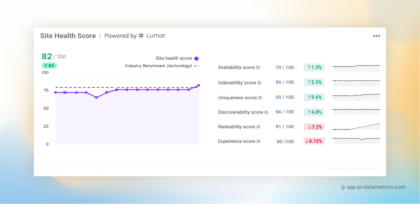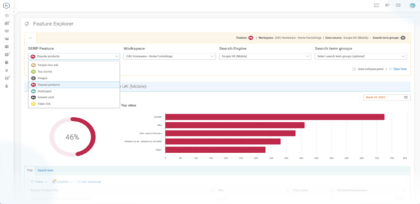Why it’s important to have daily tracking over weekly
24 May 2019
SEO rank tracking: Daily over weekly for flagship terms
There are a lot of SEO rank tracking tools out there, all offering slightly different outputs and results. Some offer monthly domain tracking, others offer weekly domain tracking.
Part of the Pi Datametrics toolset is daily SEO tracking (we also offer weekly, monthly and 2 hourly) across any search engine in the world. At Pi we track every URL (not just domains) for the top 100 results in any search engine for any given search term in our database - every single day. What's more we store all that data so you can retrospectively check who was in a particular position on any given day, or where a new competitor has just sprung from - even if you hadn't originally specified them as one of your designated competitors.
With daily rank tracking, you can see so much more, and can dictate overall strategy for your online offering. It's therefore a good strategy to have daily tracking for the most important flag-ship terms, then weekly or monthly for big data sets. (For example, some of our customers have several hundred thousand on monthly, then 20,000 on daily).
![]()
What do you do with just weekly rank tracking?
A large London based advertising agency last week told us about how they use one another competitor analysis tool:
“We have been trying to get all our web teams using our SEO platform everyday but that’s pretty hard when there's only weekly updates. They’re excited on day one, but then what for the next 6 days?”
You can have up to 7 URL changes within one week. With weekly SEO tracking you won’t see this.
Chart 1 - Weekly SEO tracking example
“Kylie Jenner”: Major news provider: Google UK

The chart above is showing weekly SEO tracking for the same search term: “Kylie Jenner” (forgive us for using this example - it just happened to demonstrate our point best).
As we can see there is a steady increase in visibility, which from the outset looks pretty positive...
Chart 2 - Daily rank tracking
“Kylie Jenner”: Major news provider: Google UK

The use of Pi's daily rank tracking, however, reveals six URL changes throughout the week ( URLs A to F returning for a single search term). With weekly SEO tracking you simply cannot see this.
Chart 1 and chart 2 show the inherent difference between weekly and daily rank tracking, and the URL flux that can occur throughout one week.
Chart 3 - Daily and Weekly SEO tracking combined
“Kylie Jenner”: Major news provider: Google UK

Just to stress that point, here we can see a combination of daily vs weekly SEO tracking overlayed.
Daily rank tracking: So much can happen in one week
As we know Google results change all the time, abruptly and without warning. Competitors can come from nowhere and your site can drop out of the conversion zone instantly.
If you’re tracking weekly, a URL in theory could be out of this conversion zone for six days without you knowing about it. If this happened across all search terms this would have a major impact on business performance.
As we know a lot can happen within 7 days; major drops, penalties or keyword cannibalisation can occur. For the Digital Manager to understand this, we need to see the daily switches between the URL - hence why we track all URLs as well, and not just domains.
It’s imperative that anyone who needs clear identification of their site’s performance, therefore needs in-depth daily SEO tracking.
Understanding the reasons behind site performance on a daily basis can impact site wide performance and online strategies.
Chart 4 - Weekly SEO tracking
“Kylie Jenner”: Major major news provider: Google UK
![]()
Again, with weekly rank tracking we can see a steady, consistent line, followed by a drop.
Chart 5 - Daily vs Weekly SEO Tracking
22 URL changes: "Kylie Jenner": Major news provider: Google UK

In the chart above, we can see the stark contrast between weekly rank tracking, and daily rank tracking - which detects 22 different returning URLs (from A to S) for the same search term “Kylie Jenner”.
If you were only tracking weekly, you simply wouldn't notice these changes. This is why daily position tracking is imperative - just studying your landing pages would not notify you of the information you'd need in this instance to diagnose and rectify search performance issues.
Chart 6 - Weekly vs Daily rank tracking
“Africa adventure holidays”: Travel reviews: Google UK

The use of daily rank tracking, in this instance, shows the site dropping below position 100+ on multiple occasions, whereas the orange line - representing weekly tracking - simply shows steady performance.
Chart 7 - Weekly vs Daily rank tracking
“Gaming laptops”: UK electrical retailer: Google UK
![]()
Taken from the Pi Datametrics Position Explorer Chart, this table demonstrates the difference between weekly rank tracking (orange line) and daily rank tracking (pink line). Weekly tracking shows that this electrical retailer is visible in Google UK for the whole time, with extremely steady performance, whereas daily tracking shows the site drops out of the top 100 a grand total of seven times.
To find out more about how our SEO platform and daily rank tracking can help you make the most important changes to your site please give us a call.
Never miss a post
Join our mailing list and have our SEO news delivered straight to your inbox.
Never miss a post
Join our mailing list and have our SEO news delivered straight to your inbox.




